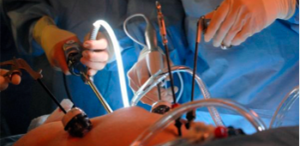
A hiatal hernia is a very common ailment among bariatric patients. Actually, its prevalence is fairly high among morbidly obese patients. It has been found that patients who have a Body Mass Index (BMI) greater than 30 are 4.2 times more likely to have a hiatal hernia than patients with a lower BMI [1]. Most of the literature on the subject agrees in that usually 40% of the patients struggling with obesity has one.
A hiatal hernia occurs when the upper part of the stomach bulges through an opening in the diaphragm (called hiatus) up to the chest [2]. Its most common symptoms are heartburn, chest pain, bloating, acid reflux, vomiting or even the sense of a bad taste in the mouth [2]. But many patients suffering from a hiatal hernia may remain asymptomatic, which makes it very difficult to diagnose.
A hiatal hernia is highly linked to Gastroesophageal Reflux Disease (GERD), the digestive disorder that causes heartburn and acid indigestion. 60% of patients with hiatal hernia have symptoms of GERD and a higher risk of erosive esophagitis [3]. These hernias are also caused by the increase of intra-abdominal pressure. In morbidly obese patients, intra-abdominal pressure is 2 to 3 times higher than that of non-obese patients [4]
Bariatric surgery is a safe and effective treatment for obesity that accomplishes weight loss and the amelioration of many obesity-related diseases like type II diabetes, hypertension, heart disease, obstructive sleep apnea, joint pain, hyperlipidemia, gallbladder disease, and so much more. In some cases, like in the Roux-en-Y gastric bypass surgery, it also ameliorates hiatal hernias. It has been believed that a bariatric surgery can improve or cure a hiatal hernia by itself, without further intervention. This is true, in most cases. However, these hernias are very stubborn and they usually make an undesired comeback, even after a repair treatment (without bariatric surgery). The recurrence rate of a hernia after its repair has been reported as high as 59% [1].
More recent research has found that a more effective and safe method is to identify the hiatal hernia before the operation and then repair it during the bariatric surgery. In other words, a concomitant hiatal hernia repair (HHR) during bariatric surgery is the best way to go in order to obtain the most long-lasting benefits out of your surgery, both in weight loss and in the prevention of hernia recurrence or enlargement.
Both gastric sleeve surgery and gastric bypass surgery have been proven as effective procedures to practice in concomitance with a HHR. The most effective procedure for tackling GERD and hiatal hernias though is the Roux-en-Y gastric bypass. Relief of GERD-related symptoms after a gastric bypass is thought to be achieved by fewer parietal cells in the gastric pouch, which naturally decreases esophageal acid reflux [5]. In this case a doctor might prefer the Roux-en-Y stand alone surgery or could practice it along with the HHR procedure, depending on his or her criteria and experience.
In presence of a hiatal hernias, a stand-alone gastric sleeve surgery is not the best choice. In the cases of a gastric sleeve surgery or in an adjustable gastric banding, a foreign body right next to a hiatal hernia could worsen the hernia and the reflux [6]. A better approach is to identify the hernia beforehand so the surgeon can design a better action plan with the patient, educate him/her about his/her surgical options and obtain a pre-operative authorization for the hernia repair, simultaneous to the bariatric surgery.
Combining a HHR with a bariatric surgery is a good option, then, for patients with morbid obesity, as it reduces GERD and the chances of the hernia reappearing. This method has been proven safer and more effective than any of these procedures done by themselves.
Hernia recurrence rate for HHR with bariatric surgery is low in comparison with a single hernia repair with fundoplication. A study with 88 patients showed a hernia recurrence rate of 12% in patients who underwent hernia repair with bariatric surgery, in comparison with a recurrence rate of 38% in hernia repairs with fundoplication [1]
To identify hiatal hernias before your surgery, your doctor may ask for an upper gastrointestinal contrast study or an endoscopy. Other doctors can try to detect it intra-operatively and then decide to intervene on it or not, but this is something both you and your doctor should discuss beforehand.
If you have any questions about suspicious gastric symptoms that lead you to think you might have a hiatal hernia, you should talk to your doctor about the possibility of getting a hernia repair along with your bariatric surgery. This will depend on many factors, but your doctor can guide you through all your choices.
At LIMARP International Center of Excellence for Obesity, located at Tijuana, our lead surgeon Liza María Pompa Gonzalez can help. She has performed thousands of bariatric surgeries to patients from all over the world and has much experience with hernial repairs in concomitance with bariatric surgery. She has been certified as Master Surgeon by the Surgical Review Corporation and she is one of the first female surgeons to be granted with this distinction.
Her clinic offers an integral bariatric program that tackles obesity from a multidisciplinary approach. The program considers non-surgical interventions like the gastric balloon and the gastric band, and surgical procedures like the gastric sleeve, the gastric bypass and the duodenal switch, along with psychological counselling, nutritional guidance, and a personalized fitness program. We also offer cosmetic surgeries for those patients who are looking for a more thorough transformation.
Our clinic is one of the top destinations for medical tourism in Tijuana. We are located right next to an urban golf course that allows great views from our private recovery rooms. We also have our own next-door-hotel, the luxurious Grand Hotel Tijuana. With our all-inclusive packages, our patients travelling from abroad can obtain a two-night stay at the hotel and transportation from the airport to the hotel and back at a very attractive price.
If you are interested in receiving bariatric surgery and treating a hiatal hernia, please call us today at (619) 270 8823 or send us a message through our webpage or any of our social media pages. We can help you decide if a bariatric surgery is the right choice for you. Don’t hesitate and call today.
Bibliography
- [1] Sutherland, V.; Kuwada T.; Gersin, K.; Mims, C.; Stefanidis, D. (2016). Impact of Bariatric Surgery on Hiatal Hernia Repair Outcomes. The American Surgeon, 82: 743-747. https://pubmed.ncbi.nlm.nih.gov/27657592/
- [2] WebMD (December 24, 2019). Hiatal Hernia. https://www.webmd.com/digestive-disorders/hiatal-hernia
- [3] Savas, N; Dagli, U.; Sahin, B. (2008). The effect of hiatal hernia on gastroesophageal reflux disease and influence on proximal and distal esophageal reflux. Dig Dis Sci, 53(9): 2380-6. https://pubmed.ncbi.nlm.nih.gov/18205046/
- [4] Varela, J. E.; Hinojosa, M.; Nguyen, N. (2009). Correlations between intra-abdominal pressure and obesity related co-morbidities. Surgery for Obesity and Related Diseases, 5: 524-8. https://pubmed.ncbi.nlm.nih.gov/19560978/
- [5] Boules, M.; Corcelles, R.; Guerron, A. D.; Dong, M.; Daigle, C.; El-Hayek, K.; Schauer, P. R.; Brethauer, S. A.; Rodriguez, J. Kroh, M. (2015). The incidence of hiatal hernial and technical feasibility of repair during bariatric surgery. Surgery, 158(4):911-918. https://pubmed.ncbi.nlm.nih.gov/26243345/
- [6] Che, F.; Nguyen, B.; Cohen, A.; Nguyen, N. T. (2013). Prevalence of Hiatal Hernia in Morbid Obesity. Surgery for Obesity and Related Diseases, 9:920-924. https://pubmed.ncbi.nlm.nih.gov/23810611/


